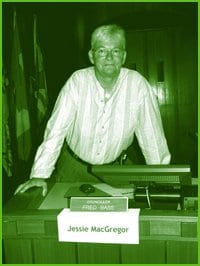The Vancouver Police Department’s (VPD) official liaison to the gay community has backed off his commitment to personally look into a trans man’s request for an apology. Jessie MacGregor made the request at city hall’s Stonewall commemoration, Jun 25.
MacGregor, who identified as a “baby butch” lesbian in the 1960s, is still angry about the way the VPD routinely raided the gay bars of that era and harassed the queers inside. “I’ve been waiting since 1965 to be apologized [to] by the Vancouver police for their violation to the community and to myself,” he told a packed gallery at the Stonewall event.
The police knew everyone by name in those bars, MacGregor later told Xtra West. They would come in and put people in chokeholds, check them for drugs and alcohol, and even force the lesbians to partially undress so they could make sure they were wearing women’s underwear. But they never made any arrests. “So to me it just smacked of constant harassment,” says MacGregor.
“We were regular folks just trying to find community. We didn’t deserve that.”
Now, MacGregor says, it’s time the VPD acknowledged its past and apologized to every “little baby dyke and lesbian” for the way it treated them in those days. “I’d like a written apology on police stationary that says, ‘Collectively, we policed badly in those days and we don’t do that anymore.'”
So far, no apology has been forthcoming.
When first contacted by Xtra West last month, the VPD’s media relations officer said she couldn’t offer any apologies until MacGregor filed an official complaint. (She has since downgraded the written requirement from a complaint to a simple letter to Chief Const Jamie Graham or his diversity advisory committee.)
“If [MacGregor] feels slighted by the past, I’m sorry,” Const Sarah Bloor told Xtra West, but she will not engage in a “public debate.”
Besides, that was a long time ago, Bloor noted, adding that the VPD has a “very different relationship” with the gay community now.
It’s that relationship that Const Chris Smith, the gay liaison, is charged with strengthening.
Xtra West asked Smith in July if he thought the VPD should offer an apology. At the time, he seemed to think it might be a good idea. He offered to make his own enquiries and study the background. “And then, fair is fair. If there is a need for an apology” he trailed off.
Then he offered, once again, to look into it. He just needed to talk to his bosses first, he noted.
Within minutes of hanging up with Smith, the VPD’s media relations officer called back. She demanded, in an angry tone, that Xtra West not approach the gay liaison on this issue.
Three weeks later, when Xtra West called the gay liaison back to see what his enquiries had produced, he refused to discuss the matter further.
“It has nothing to do with me,” Smith said Aug 6. The apology request is not related to “my current mandate.”
Only media relations can speak to this question, he added. “I can’t speak out of turn.”
While the apology does not involve Smith directly, since the alleged actions occurred before the 33-year-old was born, it does involve the VPD’s historic relationship to the gay community-a community whose trust Smith is supposed to be earning on behalf of the force.
When Xtra West called Bloor back to ask why the gay liaison can’t comment on this issue, she explained that it’s her job to address the media, not Smith’s.
Smith is building trust between the VPD and the gay community, she insisted. But his role is to work within the community, not to answer its newspaper’s questions.
MacGregor isn’t surprised by the VPD’s apparent reluctance to apologize. “If anything, the Vancouver police have demonstrated an intransigence [towards acknowledging] anything that would remotely imply any wrongdoing on the part of its officers,” he says.
Still, now that the written requirement for an apology has been downgraded from a formal complaint to a simple letter, MacGregor says he might be willing to pursue the matter further.
Meanwhile, he says, it’s also time for another gay community policing conference. Though there have been a couple of meetings in the last few years, MacGregor has a specific exercise in mind. He’d like the cops to participate in a series of “cut-to-the-chase discussions” where community members detail the ways in which officers have hurt them. It would be like a First Nations healing circle, he says.
And it wouldn’t just be for the officers who actually raided the bars in the 1960s. “Yeah, okay, you didn’t do it,” MacGregor tells the new generation, “but your fellow officers did-and you need to own this.”

 Why you can trust Xtra
Why you can trust Xtra


